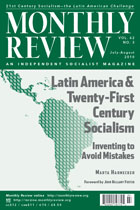Communal Councils
Venezuela: Revolution brings substantial improvements to working-class neighbourhoods

Hillside barrios in Caracas.
Marta Harnecker: 'Chavez's legacy: with the people, building a socialist alternative to capitalism'

Thousands turn out in Caracas to remember Chavez.
By Marta Harnecker, translated by Yoshie Furuhashi for MRZine
March 6, 2013 -- La Segunda -- When Hugo Chávez triumphed in the 1998 presidential elections, the neoliberal capitalist model was already floundering. The choice then was whether to re-establish the neoliberal capitalist model -- clearly with some changes including greater concern for social issues, but still motivated by the same logic of profit seeking -- or to go ahead and try to build another model.
Venezuela: Eyewitness impressions of the Bolivarian revolution
October 25, 2012 – Green
Grassroots interviews from Venezuela: Developing the power of the community

Ana Marin talks about her revolutionary activity.
Solidarity statements: 'A vital victory for Chavez, Venezuela and the Bolivarian revolution'
 Brigadistas from the Australia-Venezuela Solidarity Network brigade get ready for the massive march in Caracas, October 4,
Brigadistas from the Australia-Venezuela Solidarity Network brigade get ready for the massive march in Caracas, October 4,Venezuela: Communes in Caracas

Concrete block production by the Ezequiel Zamora Commune, Antimano, Caracas.
September 7, 2011 -- Cuidad CSS, translated by Owen Richards for Venezuela: Translating the Revolution. Posted at Links International Journal of Socialist Renewal with permission -- Among the aims of community organisation is that of building the communal state, where power is exercised directly by the people, through self-government, with an economic model of social property and local self-development.
Based on this premise, 236 communes and more than 9000 communal councils have been established, according to information from the Ministry of Popular Power for the Communes.
Through this process the city of Caracas has turned into a space full of examples of self-government.
Socioeconomic model
In the Capital District around 44 sectors exist that are in the process of building communes in order to lay the foundations for Venezuelan socialism.
In the Antimano ward, 18 communal councils of the Carapita sector and part of Santa Ana organised to establish the Victoria Socialist Commune.
What if the state of the world were measured by its majority?

What real democracy looks like: a communal council in Merida votes for its electoral commission in July 2010.
Michael Lebowitz on the socialist alternative and real human development
Prof. Michael Lebowitz on the socialist alternative from Dangerous Minds at Vimeo.
August 30, 2010 -- Michael Lebowitz is a Canadian Marxist economist. He is the director of the “Transformative practice and human development” program at the Venezuela-based left-wing think tank, the Centro Internacional Miranda. He is professor emeritus of economics at Simon Fraser University and author of Build it Now: 21st Century Socialism and the 2004 Isaac Deutscher-prize winning Beyond Capital: Marx's Political Economy of the Working Class. His latest book is The Socialist Alternative: Real Human Development.
Venezuela: Communal power in Caracas

John Bellamy Foster on Venezuela: Marxism and `vernacular revolutionary traditions'

The following article is the Foreward to the July-August 2010 issue of the US socialist magazine Monthly Revi
Eric Toussaint: Venezuela's Bolivarian revolution at the crossroads?
By Eric Toussaint
[See parts 2 , 3 and 4 below.]